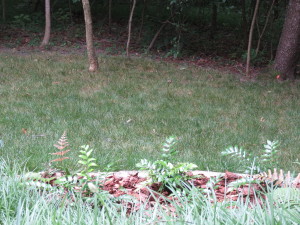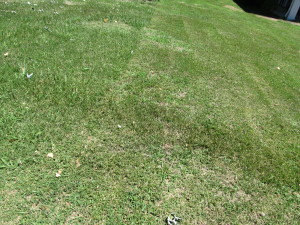The arrival of summer’s heat and dry weather is a clear sign to raise the cutting (mowing) height of your lawn grass. Every grass species have a recommended height at which it should be mowed for best health. The cutting height will change with the season. Location in the yard is also important. Here on some basic tips.
Recommended Mowing Heights of Grass Species:
Burmuda grass* – ½ to 1 ½ inches
Zoysia grass* – ¾ to 1 ½ inches
Centipede grass – 1 ½ to 2 inches
St Augustine grass – 2 to 4 inches
Fescue – 3 to 4 inches
A general rule to follow is to remove only one-third of a grass plant at any one mowing. For example, if you regularly mow your fescue lawn at 3 inches, allow it to grow to 4.5 inches tall before mowing.
In temperate areas (zones 5 to 7), most lawns are composed of tall fescues and/or bluegrasses. These grasses are usually mowed at 2 1/2 to 3 inches high. In partial shade fescue may be cut slightly taller @ 3 1/2 inches. In summer, mowing height should be raised a minimum of ½ to 1 inch taller than spring. Raising the mowing height results in deeper rooting and better drought and heat tolerance.
In summer’s heat and drought, if your lawn does not need mowing, DON’T!! Reduce mowing frequency in summer unless your lawn is irrigated and fertilized. Cool season grasses such as fescues and bluegrasses naturally grow slower (“summer dormancy”).
Growth of warm season grasses (burmuda, zoysia, centipede, and St. Augustine) also slow down when soil moisture is low. Raise the mowing height of bermuda grass and zoysia grass lawns as autumn approaches to protect the turf from winter injury.
Scalping (too close cutting) favors growing of undesirable grass species and weeds. For example, low mowing in early spring leads to invasion of weedy annual bluegrass (Poa annua). Scalping fescue lawns results in seedling burmuda grass, crabgrass, goosegrass, and other weeds.



 Posted in
Posted in 
